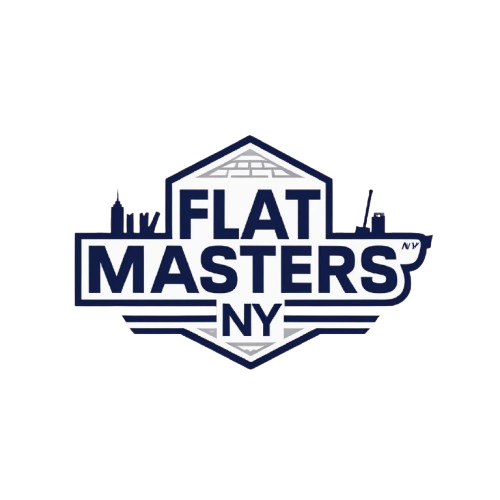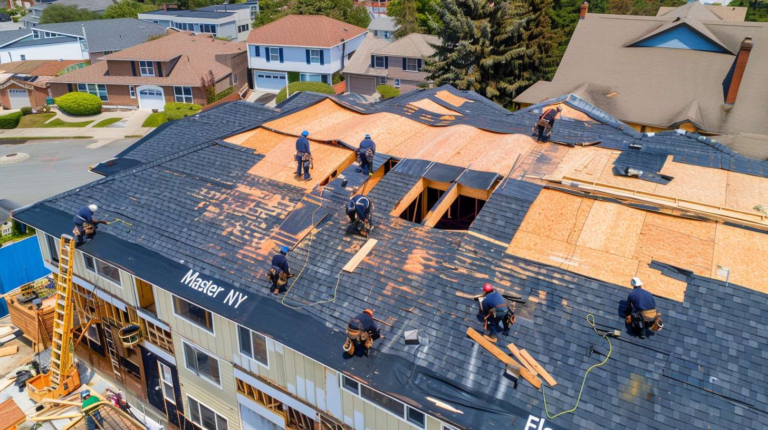How Much to Redo Flat Roof Cost: Your Complete Pricing Guide
Flat roof replacement in Queens typically runs between $8,500 and $18,000 for an average-sized residential building, with commercial projects ranging from $12 to $22 per square foot depending on materials and complexity. Most homeowners in our area spend around $12,500 to completely redo their flat roof, though I've seen prices swing dramatically based on what we find once we start peeling back layers.
Roofing Cost Calculator
Get Your Free Estimate in 5 Simple Steps
Your Estimated Price Range:
Final pricing may vary based on actual conditions.
Get your personalized quote with exact pricing.
Look, I've been redoing flat roofs across Queens for over two decades, and if there's one thing I can tell you about flat roof costs, it's this: every job tells a different story. Just last month on 43rd Avenue in Elmhurst, we quoted a homeowner $11,200 for what looked like a straightforward EPDM replacement. Once we got up there and started the tear-off, we discovered three layers of old roofing, rotted decking, and drainage issues that nobody knew existed. Final cost? $16,800.
Flat Roof Material Costs Breakdown
The material you choose makes the biggest difference in your final bill. Here's what we're seeing in 2025 for material costs per square foot installed:
- EPDM Rubber Roofing: $8-$12 per sq ft
- TPO (Thermoplastic): $9-$14 per sq ft
- Modified Bitumen: $7-$11 per sq ft
- Built-up Roofing (BUR): $6-$10 per sq ft
- Liquid Applied Membrane: $10-$16 per sq ft
Now, before you go shopping for the cheapest option, let me tell you something about Queens weather. We get hammered with everything - from nor'easters coming off the Atlantic to those brutal summer heat waves that make asphalt soft as butter. The salt air from Jamaica Bay doesn't do any favors either. I've seen too many homeowners go cheap on materials only to call me back three years later when their roof is failing.
EPDM has been my go-to recommendation for residential flat roofs in this area. It handles our temperature swings better than anything else, and when properly installed, I've seen these roofs last 25+ years without major issues.
Labor and Installation Factors
Labor typically accounts for 60-70% of your total project cost. Our crews charge between $4.50 and $7.00 per square foot for standard installation, but this can jump significantly if we're dealing with:
- Multiple layers of existing roofing that need removal
- Structural repairs to decking or joists
- Drainage modifications or new drain installations
- Parapet wall repairs or flashing work
- Accessibility issues (narrow streets, no parking, difficult building access)
Here's something most contractors won't tell you upfront - tear-off costs can eat up your budget fast. If you've got two or three layers of old roofing up there (which is common in older Queens buildings), we're looking at an additional $2-4 per square foot just for removal and disposal. And don't get me started on asbestos abatement if we're dealing with a building from the 60s or 70s.
Size and Square Footage Pricing
Most residential flat roofs in Queens range from 800 to 1,500 square feet. Here's how size affects your total investment:
- 800-1,000 sq ft: $8,500-$13,500
- 1,000-1,200 sq ft: $11,000-$16,200
- 1,200-1,500 sq ft: $13,500-$20,500
- 1,500+ sq ft: $17,000-$28,000+
Commercial projects work differently. We typically price these by the square foot with volume discounts kicking in around 5,000 square feet. Large commercial jobs might run $10-18 per square foot, but they come with their own complications - union requirements, specific material specifications, and schedules that need to work around business operations.
Hidden Costs That Catch People Off Guard
I can't tell you how many times I've had to have uncomfortable conversations with property owners about costs that nobody saw coming. The permit alone in NYC runs $300-800 depending on your building size and location. Then there's the structural inspection if the building department decides they want one - that's another $500-1,200.
Drainage issues are the big killer though. Last fall, we were working on a building in Jackson Heights where the owner thought he just needed a simple roof replacement. Once we started the work, we realized the entire drainage system was backing up into the building's walls. What started as a $14,000 roof job turned into a $23,000 project because we had to reroute drains, repair water damage, and upgrade the entire drainage system to current code.
And here's something that drives me crazy - other contractors who don't factor in disposal costs properly. In Queens, we're looking at $400-800 in disposal fees for a typical residential tear-off, more if there's multiple layers or hazardous materials involved.
Seasonal Pricing Variations
Timing matters more than most people realize. Spring and early summer are peak season, and prices reflect that demand. We're typically 15-25% busier from April through July, which means less flexibility on pricing and longer wait times for scheduling.
Fall can be a sweet spot - we're still getting good weather for installation, but the urgency isn't there like it is in spring when people are dealing with winter damage. Winter work is possible (we do it all the time for emergency situations), but it requires additional planning and sometimes specialized materials that handle cold-weather installation.
When to Repair vs. Complete Replacement
This is where experience really matters. I've seen homeowners throw good money after bad trying to patch a roof that really needed full replacement. Generally speaking, if your flat roof is more than 15 years old and you're looking at repair costs over $4,000, it's time to have a serious conversation about full replacement.
Patching might buy you a year or two, but it rarely addresses underlying issues. I always tell customers - if you're planning to stay in the building for more than five years, invest in doing it right the first time.
Getting Accurate Quotes in Queens
Here's my advice for getting realistic pricing: never accept a quote without a thorough roof inspection. Any contractor who gives you a firm number from the ground is either inexperienced or cutting corners somewhere. We always do a complete assessment that includes checking the existing membrane, drainage systems, flashing conditions, and deck integrity.
Get at least three quotes, but don't automatically go with the lowest bid. I've cleaned up too many jobs from contractors who underbid projects and then tried to make up the difference with change orders or corner-cutting during installation.
Make sure your contractor is properly licensed (you can verify this through NYC Buildings Department), carries adequate insurance, and can provide local references from recent work. In our business, reputation in the neighborhood matters more than fancy websites or flashy advertising.
Financing and Payment Considerations
Most of our customers pay through a combination of savings and financing. Many choose to finance flat roof replacements through home equity lines of credit since the interest is typically tax-deductible and rates are reasonable for this type of home improvement.
We work with several local banks that understand roofing projects, and there are city and state programs that sometimes offer assistance for energy-efficient roofing upgrades. It's worth checking with NYSERDA to see if your project qualifies for any rebates or financing assistance.
One thing I always tell customers - don't let financing drive your material choices too heavily. Spending an extra $2,000-3,000 for quality materials and proper installation can save you thousands in repairs and early replacement costs down the road.
At Flat Masters NY, we've helped hundreds of Queens property owners navigate these decisions over the years. Every situation is different, but with proper planning and realistic expectations, a flat roof replacement can be a solid investment that protects your property for decades to come. The key is working with experienced contractors who understand local conditions and building requirements, and who will give you straight answers about what your project really needs.


